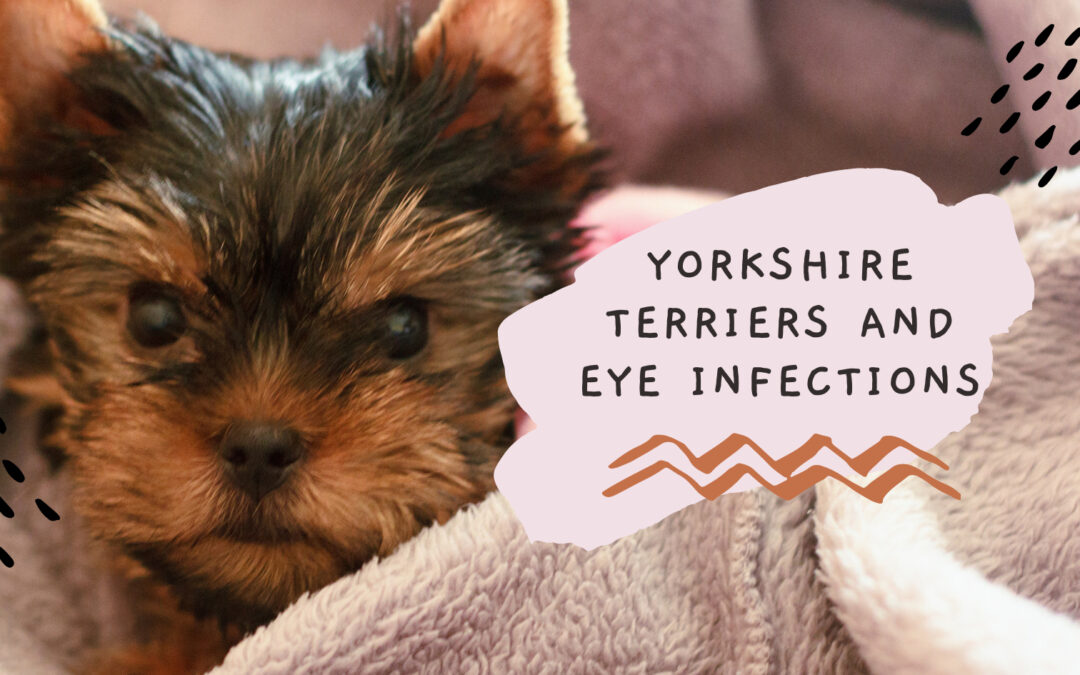Yorkshire Terriers are known for their beautiful long coats and lively personalities, but like many small breeds, they can be prone to certain health issues. One common concern for Yorkshire Terrier owners is the risk of eye infections in their furry companions.
Eye infections can cause discomfort and irritation for dogs, and pet owners need to be aware of the signs and symptoms to ensure their Yorkshire Terriers receive prompt and proper treatment.
The Yorkie Times is here to go over the importance of Yorkshire Terriers and eye infections. We will explore the causes and symptoms of eye infections in Yorkshire Terriers, as well as the potential treatment options available. We will also discuss preventative measures that can be taken to reduce the risk of eye infections in these beloved little dogs.
Whether you’re a proud Yorkshire Terrier owner or considering bringing one into your family, understanding the potential health issues they may face, such as eye infections, is essential for providing them with the best care and ensuring their overall well-being. So, let’s dive into the world of Yorkshire Terriers and how to keep their eyes healthy and infection-free.
Common Eye Infections in Yorkshire Terriers
Yorkshire Terriers are prone to several common eye infections, such as conjunctivitis, keratoconjunctivitis sicca (dry eye), corneal ulcers, and glaucoma. These infections can cause symptoms like redness, discharge, and excessive tearing. Regular check-ups with a veterinarian are important for early detection and treatment of these eye conditions to prevent further complications and ensure the overall health and well-being of the Yorkshire Terrier.

Check Out Our Watercolor Yorkshire Mom and Puppy
Conjunctivitis in your yorkie
Conjunctivitis, also known as pink eye, can affect your Yorkie’s eyes and cause redness, discharge, and irritation. This condition can be caused by a variety of factors, including viral or bacterial infections, allergies, or foreign objects in the eye.
Common symptoms of conjunctivitis in Yorkies include redness, swelling, excessive tearing, and squinting. If you notice any of these symptoms in your dog, it’s important to take them to the vet for a proper diagnosis and treatment.
Treatment options for conjunctivitis in Yorkies may include medicated eye drops or ointments, antibiotics, or antihistamines depending on the underlying cause. It’s important to follow your vet’s instructions carefully and monitor your dog’s progress to ensure their eyes are healing properly. With proper treatment, most cases of conjunctivitis in Yorkies can be resolved effectively.
Keratoconjunctivitis sicca (dry eye)
Keratoconjunctivitis sicca, also known as dry eye, is a common condition in Yorkies that can cause discomfort and irritation. This condition occurs when the eyes do not produce enough tears to keep them moist, resulting in dry, itchy, and inflamed eyes.
Some common symptoms include excessive blinking, redness, discharge, and sensitivity to light. There are several potential causes of dry eye in Yorkies, including genetics, immune system disorders, medication side effects, and certain infections.
Fortunately, there are a variety of treatment options available to help manage this condition. This may include artificial tear drops, medications to promote tear production, and in some cases, surgical procedures to improve tear retention. It’s important for Yorkie owners to consult with a veterinarian to properly diagnose and manage dry eye in their pets, in order to alleviate discomfort and prevent any potential complications.
Other common eye infections in Yorkshire Terriers
Aside from conjunctivitis, Yorkshire Terriers are also prone to other common eye infections such as corneal ulcers and glaucoma. Corneal ulcers are open sores on the cornea that can be caused by a variety of factors including infections, trauma, or dry eye. Because Yorkies have protruding eyes, they may be more susceptible to corneal ulcers if they accidentally scratch or injure their eyes.
Glaucoma, on the other hand, is a condition characterized by increased pressure within the eye, which can lead to damage of the optic nerve and potential vision loss. Yorkies may be genetically predisposed to developing glaucoma, and it can be a serious and progressive condition if left untreated. It is important for Yorkshire Terrier owners to be vigilant in monitoring their dog’s eye health and to seek veterinary care if any signs of eye infections or discomfort are present.
Preventing Eye Infections in Yorkshire Terriers
Preventing eye infections in Yorkshire Terriers is crucial for maintaining their overall health and wellness. Proper grooming and hygiene practices are essential for preventing eye infections in this breed. Regularly cleaning around the eyes, and using a gentle and dog-friendly eye wash solution can help reduce the risk of infections. Trimming the hair around the eyes can prevent irritation and keep the area clean.
Regular veterinary check-ups are also important for catching any potential eye infections early and preventing them from becoming more serious. A veterinarian can provide expert advice on proper eye care and any necessary treatments. Nutritional considerations should be taken into account for maintaining eye health in Yorkshire Terriers. Providing a balanced diet with essential vitamins and nutrients such as vitamin A, omega-3 fatty acids, and antioxidants can contribute to healthy eyes. By incorporating these practices into their care routine, Yorkshire Terrier owners can help prevent eye infections and ensure their furry companions’ eyes stay bright and healthy.
Get The Yorkie Times Newsletter delivered to your inbox!
Signs and Symptoms of Eye Infections
If you have a Yorkie, it’s important to be aware of the signs and symptoms of eye infections. One of the most common signs is redness or irritation in the eyes. This can be accompanied by watery or excessive discharge, which may be yellow or green in color. If you notice your Yorkie squinting or blinking abnormally, it could be a sign that they are experiencing discomfort in their eyes.
Other symptoms to watch out for include rubbing or pawing at the eyes, as well as sensitivity to light. It’s also important to look out for any changes in the appearance of the eyes, such as cloudiness or a color change. If you notice any of these signs, it’s important to seek veterinary care as soon as possible.
Eye infections can be uncomfortable and potentially serious for Yorkies, so early intervention is key to preventing complications. Regular eye examinations and good hygiene practices can also help to prevent infections in the first place. Keep a close eye on your Yorkie’s eyes and seek prompt care if you notice any concerning symptoms.
Treatment of Eye Infections in Yorkshire Terriers
The treatment for eye infections in Yorkshire Terriers typically involves medications and ointments prescribed by a veterinarian. These may include antibiotics to help clear up the infection and reduce inflammation. For mild infections, there are also home remedies that can be used, such as cleaning the eyes with a saline solution or using a warm compress to help soothe discomfort. However, it is important to consult with a veterinarian before using any home remedies to ensure they are safe and effective for your dog.
In severe cases, where the infection does not respond to medication or if there is a more serious underlying issue, surgical interventions may be necessary. This could involve procedures such as eyelid surgery to correct a congenital defect or to remove an irritating foreign object. Prompt and appropriate treatment of eye infections in Yorkshire Terriers is important to prevent any potential long-term damage to their vision and overall eye health.
With more understanding of Yorkshire Terriers and eye infections, we hope you can be confident in the prevention, notice, and treatment of eye problems. Consult your regular veterinarian with any further questions and concerns you may have. The Yorkie Times wants to keep all Yorkie owners informed and up to date on all things Yorkie health-related. Follow us and browse our previous posts to make sure your Yorkie is happy and healthy.





Recent Comments